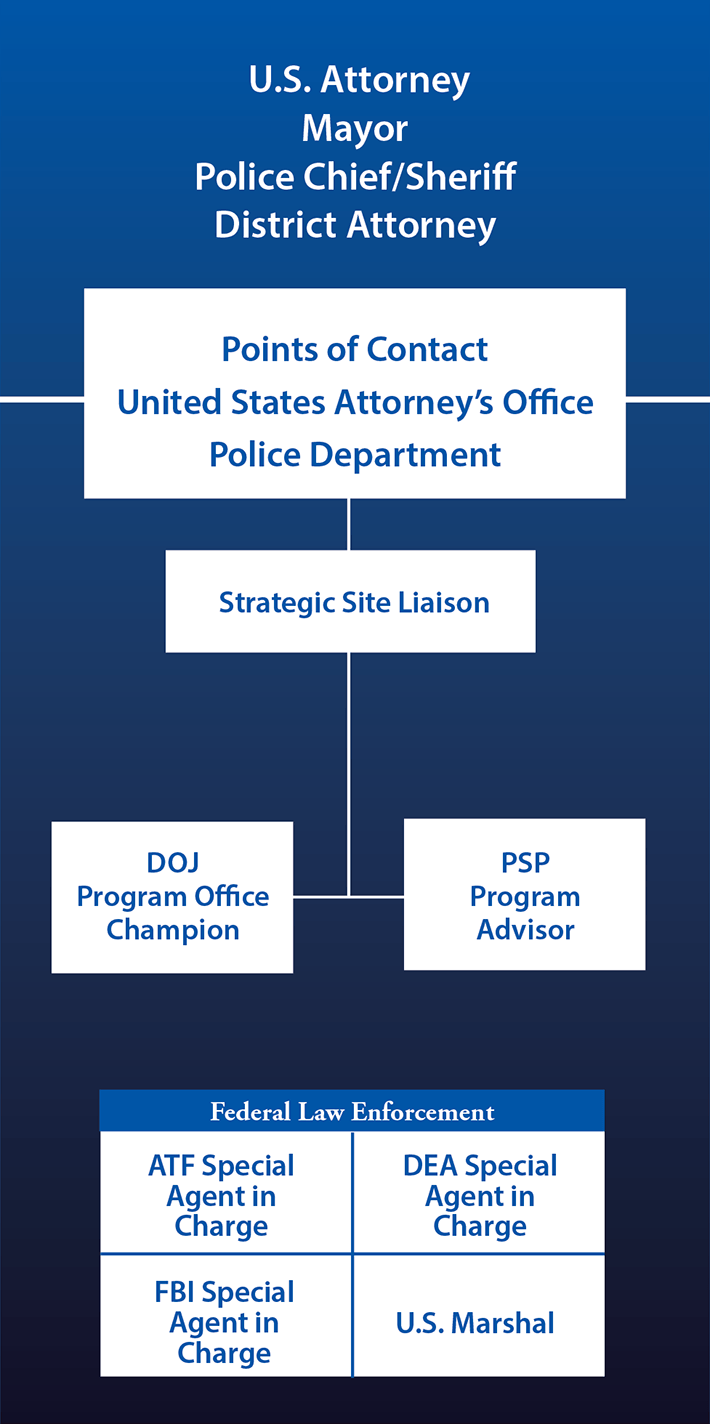About
The National Public Safety Partnership (PSP) was established by the U.S. Department of Justice (DOJ) to provide an innovative framework to enhance federal support of state, local, and tribal law enforcement and prosecution authorities in enhancing public safety.
PSP began as a pilot program, the Violence Reduction Network, in 2014 and is designed to promote interagency coordination by leveraging specialized law enforcement expertise with dedicated prosecutorial resources to promote public and community safety.
PSP serves as a DOJ-wide program that enables participating sites to consult with and receive expedited, coordinated training and technical assistance (TTA) and an array of resources from DOJ to enhance local public safety strategies. This model enables DOJ to provide jurisdictions of different sizes and diverse needs with data-driven, evidence-based strategies tailored to the unique local needs of participating cities to build their capacities to address violent crime challenges. PSP has engaged with more than 60 sites since the program’s inception.
DOJ is committed to advancing work that promotes civil rights, increases access to justice, supports crime victims, protects the public from crime and evolving threats, and builds trust between law enforcement and the community. The PSP initiative supports and advances DOJ’s principles in all of its activities.
PSP Approach
- 3-Year Commitment
- Strategic Site Liaison Assigned
- Annual Violent Crime Summit
-
Expedited Delivery of Assistance in Eight Core Areas:
- Community Engagement
- Constitutional Policing
- Crime Analysis
- Criminal Justice Collaboration
- Federal Partnerships
- Gun Violence
- Investigations
- Technology
- Peer Learning and Exposure to Communities of Practice
Notable Accomplishments
- The Albuquerque, New Mexico, Police Department implemented its own unique CompStat program, called Duke City Stats, which incorporates federal law enforcement partners, local prosecutors, and tribal chiefs in the process. Aided by federal partners, the department also created a violent crime drivers list to target the most prominent offenders for prosecution.
- The Antioch, California, Police Department made great strides in its community engagement efforts, establishing strong partnerships with local organizations, implementing community policing initiatives, and working to establish positive interactions with the community.
- The Gary, Indiana, Police Department refreshed its weekly homicide review meeting, expanding it to include representatives from the Lake County Homicide Task Force, the Indiana State Police, the Indiana State Excise Police, the Lake County Prosecutor’s Office, the U.S. Attorney’s Office, and federal partners to review every shooting and death case and plan for next steps.
- The Minneapolis, Minnesota, Police Department is focusing on several areas, including building a stronger and more action-oriented CompStat review process, with diligent follow-up and accountability in the area of gun crime reduction, maximizing the contributions from both internal and external partnerships.
- The Raleigh, North Carolina, Police Department developed a strategic plan with its local, state, and federal partners to combat gun crime, vowing to reduce violent crime by 15% over the next 3 years by addressing the risk factors that lead to violent behaviors and enhancing protective factors that reduce victimization. It established four goals: improve intelligence sharing, enhance its capacity to reduce juvenile-related crime, address human trafficking and child exploitation, and develop a community violence intervention plan.
- The Rochester, New York, Police Department experienced a 36% reduction in homicides and a 29% decline in nonfatal shootings between 2023 and 2024, the result of a nonfatal shooting team, an enhanced juvenile recidivism program, and strong federal law enforcement partnerships.
- The Tucson, Arizona, Police Department focused on expanding its Crime Gun Intelligence Center by revamping its Investigation Unit, adding a second National Integrated Ballistic Information Network (NIBIN) machine, and integrating the NIBIN Enforcement Support System into its records management system, leading to increased clearance rates for homicides and nonfatal shootings.
- The San Antonio, Texas, Police Department assisted with advocating for 17 assistant prosecutor positions in Bexar County; secured a $600,000 county grant to hire a private lab to process drug cases; and increased collaborations with the U.S. Attorney’s Office and the district attorney to identify cases for prosecution.
- The Vallejo, California, Police Department worked with federal law enforcement partners on two take-down operations, which led to the arrest of eight repeat offenders and the recovery of 24 guns and drugs including fentanyl, methamphetamines, and cocaine.
To read more information about the sites, click here.
PSP Site Team




